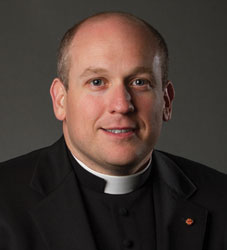 A little under two weeks ago, word began to spread around social media regarding a young priest in a midwestern diocese who was found to have taken his own life. News of this kind is always hard because, as the Catechism of the Catholic Church teaches, “suicide contradicts the natural inclination of the human being to preserve and perpetuate his life (CCC 2281).” I must admit that, even though I did not know this priest, this news hit me at my core and dogged my thoughts for several days.
A little under two weeks ago, word began to spread around social media regarding a young priest in a midwestern diocese who was found to have taken his own life. News of this kind is always hard because, as the Catechism of the Catholic Church teaches, “suicide contradicts the natural inclination of the human being to preserve and perpetuate his life (CCC 2281).” I must admit that, even though I did not know this priest, this news hit me at my core and dogged my thoughts for several days.
While priests have no special hold on grace or any unique immunity from suffering, it can be generally assumed that, in spite of the effects of sin in the world and in our own lives, we form a certain disposition to keeping our eyes on the things of heaven, which in turn yields a certain amount of hope. So what happened here with this young priest, Father Harkins, who had so much life, so much good work ahead of him? This question is not unique to this situation only as similar questions are often posed when people are made to deal with the heart-breaking reality of someone’s suicide.
Life is a precious gift, which is given by God and only God may call that gift back to himself. The Church teaches that the act of taking one’s own life is gravely wrong because it violates God’s own love of the individual, just love of self, and the good of others who will suffer because of the act (CCC 2281). However, the Church also recognizes that in many, many cases, if not all one might argue, the person who commits such an act does not do so freely because it goes against the natural inclination of self-preservation.
The Catechism states: “grave psychological disturbances, anguish, or grave fear of hardship, suffering, or torture can diminish the responsibility of the one committing suicide (CCC 2282).” In the case of Father Harkin, it is believed that he was the victim of a severe adverse reaction to a prescription drug that he had recently been given for serious digestive problems; the drug’s side effects for him included consistent nightmares and extreme levels of anxiety.
If you have been affected by the suicide of a loved one, please do not lose hope in the goodness and mercy of God. The Church teaches and believes: “we should not despair of the eternal salvation of persons who have taken their own lives. By ways known to him alone, God can provide the opportunity for salutary repentance. The Church prays for persons who have taken their own lives (CCC 2283).” Sadly, many Catholics do not know this aspect of the Church’s teaching. If you have been affected by suicide and suffered further from being told something completely different from what the Church teaches, please know how truly sorry I am for the additional pain that you experienced.
Our ultimate hope is in the mercy of the crucified and risen Christ, to whose love we commend all the faithful departed, especially those who may have lost sight of the Lord in a tragic moment of darkness and despair; may their souls, the soul of Father Harkins, and the souls of all the faithful departed, through the mercy of God, rest in peace. Amen.
Father Christopher House is the Rector of the Cathedral and serves in various leadership roles within the diocesan curia, namely Chancellor and Vicar Judicial.